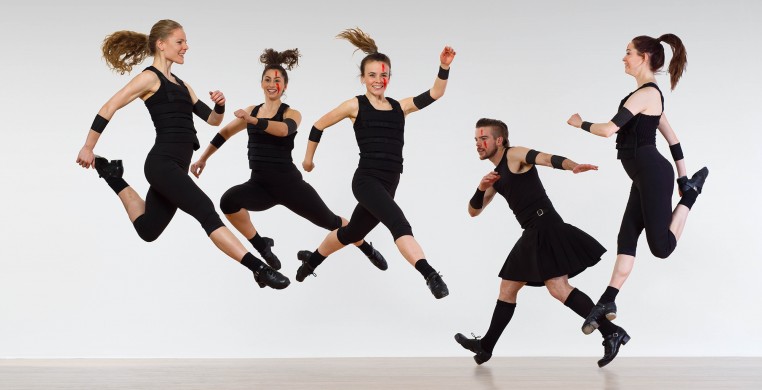What’s extra special about Trinity Irish Dance Company this season? “Everything!” said associate artistic director and Trinity dancer Chelsea Hoy in a recent phone interview. Enthusiasm has never been in short supply for Chicago’s Irish cultural treasure, but Hoy, just off the plane and catching her breath from the company’s live stage performances in Overland, Kansas this past weekend, could barely contain herself. “This was the first time in 22 months and eighteen days since the company performed in front of a live audience!” Next up is their third appearance in the Auditorium Theatre’s “Made In Chicago” series this Saturday, February 5th, and serves as a fitting send-off for the rest of their season. (See below for tickets and details).
Drawing a devoted Chicago audience of longtime fans from across the city’s diversity of neighborhoods, ages, cultures, and interests, the company’s performance at the Auditorium represents its mission to bring the traditions of Irish dance onto the concert dance stage as a progressive dance genre. “Trinity is the only Irish dance ensemble repertory company in the world,” Hoy said, explaining that Trinity is always creating new dance repertory, incorporating traditional Irish step dancing with idioms and influences from outside those traditions. It differs from commercial productions like “Riverdance” and “Lord of The Dance,” which design and market their tours around a single program, with a spectacle-style format, and do not develop choreographic repertoire. “The untold history is that founding artistic director Mark Howard’s early company, begun in 1990, was the impetus that opened up the possibilities for the form and led directly to commercial productions such as “Riverdance” Hoy said in an aside.
Trinity celebrates individuals and shuns the “cookie-cutter” aesthetic and autocratic management style of many dance companies. “All of the dancers are involved in the creative process,” Hoy explained. “The dancers’ voices really matter in the studio. It’s a very collaborative setting.” Inclusion is a hallmark of Trinity. “We don’t care about body types. Just be in your best shape.” Hoy quotes director Mark Howard as saying, “Irish dance belongs to everyone!” Trinity’s repertoire is all about dynamic movers, Hoy says, and how you connect to the audience.
Much excitement revolves around the four dancers making their company debuts this season, each bringing unique regional, cultural and artistic qualities into the mix.
Francisco Lemus grew up tap dancing in Puebla, Mexico, and fell in love with Irish dance when he first encountered it on Youtube.
Kaitlyn Sardin hails from Orlando, Florida, where she began her dancing life as a ballet dancer. She is the first Black dancer in the company’s 30-year history. She began creating videos during the pandemic with the fusion of hip-hop, vogue, contemporary and Irish dance. Colleen O’Connor grew up in Pittsburgh, PA, making the rounds of Irish dance competitions. She is a graphic artist who has done work for numerous non-profits in Chicago. She is especially interested in the combination of 2-D and 3-D art.
Danielle Masbruch, at 33, becomes the oldest company member. She began her dancing life at an a-typical age in Seattle, WA.
Trinity’s current program is a mix of recent repertory and the company’s “greatest hits” as they head into a March week-long run at New York's acclaimed Joyce Theater, featuring the 2020 Chicago season premiere, “American Traffic,” choreographed by famed tap dancers Michelle Dorrance and Melinda Sullivan, as a hybrid of American tap dancing and Irish step dance. “It’s a unique demonstration of what Trinity does on stage,” Hoy said, “with the intersection of two forms (that give) birth to new percussive forms.”
Chicago audiences will celebrate the world premiere of "Sparks" (2022), choreographed by Mark Howard and featuring the technical prowess of Artistic Associate and solo world champion Ali Doughty and the virtuosity of two-time All Ireland fiddle champion Jake James. "Sparks" gets its name from Jackson Sparks, the 8 year-old boy who lost his life in the Waukesha, WI parade tragedy.
“Soles,” (2018) choreographed by Mark Howard, “is tribal and timeless,” Hoy said. “What’s unusual is that it’s as much about silence as noise.” Unlike traditional Irish dance, which is thunderously loud, “Soles” is one example of the influence Trinity's longstanding relationship with Japan has had on the work, with the silences reflecting those of Japanese “Noh” theatre. The piece was inspired by something Howard remembered his father, Michael Howard saying: “When the soles of your shoes have worn off, you’re back on your feet again.”
“The Black Rose” (2004), also choreographed by Howard, brings in another influence of Japanese Taiko drumming. Centered around an ancient Irish Lamberg drum, which is housed in the Irish American Heritage Center Museum when not on stage with TIDC, and played with drum sticks. Trinity was the first Irish dance company to initiate the convention of blending the foot percussion of Irish dancing with the instrumental percussion of hand drumming.
“An Sorcas (The Circus)” (2019), a collaboration between Howard and Hoy, features original music by the TIDC band, and examines the battle between substance and spectacle.
Other works on the program include “Johnny,” Howard’s tribute to NBC Tonight Show host Johnny Carson, performed live on TV at NBC Studios in Burbank, CA, March 15, 1991; and “Communion” (2014), a synthesis of forms choreographed by Howard and Sandy Silva; and Howard’s “Push” (2014).
--
Trinity Irish Dance Company performs Saturday at the Auditorium Theatre, 50 East Ida B. Wells Drive. Tickets are $30-$76 and available at auditoriumtheatre.org or 312.341.2300. For more details, click the event page below.


